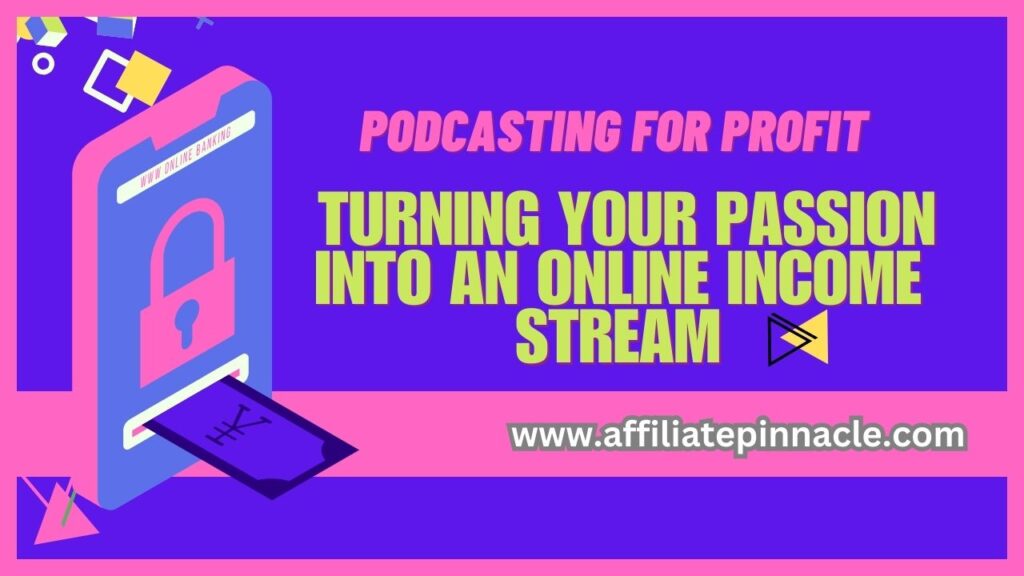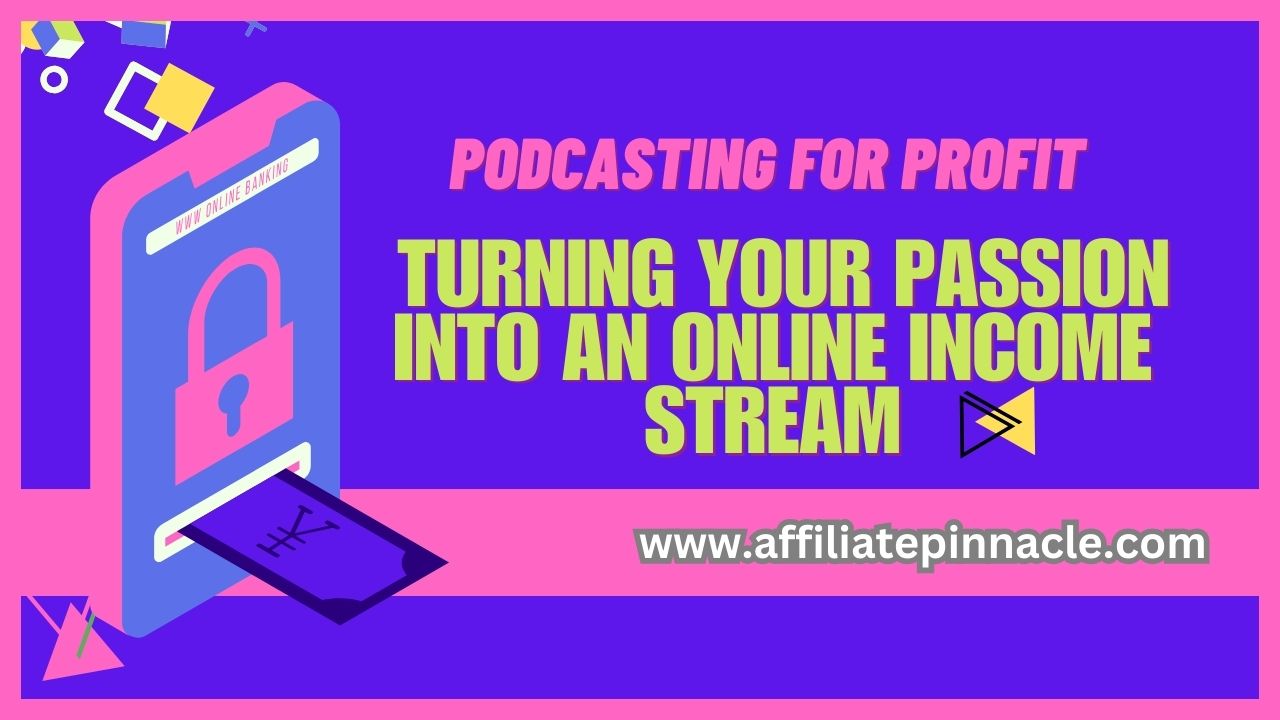In recent years, podcasting has taken the world by storm, offering individuals a unique platform to share their passions, expertise, and stories with a global audience. What started as a niche hobby has evolved into a lucrative business opportunity. Podcasting not only allows you to connect with like-minded people but also offers a pathway to turn your passion into a profitable online income stream. In this article, we’ll explore five key points to help you maximize the potential of podcasting and generate revenue from your creative endeavors.
“Cash Flow Explosion: Start Earning Big Bucks TODAY – Absolutely FREE Training!”
- Find Your Niche and Build Your Brand: The first step in turning your podcasting passion into a profitable venture is to identify your niche. What are you passionate about? What topics do you have extensive knowledge or experience in? The key to a successful podcast is finding your unique angle within your chosen niche. Whether it’s discussing gourmet cooking, vintage video games, or true crime mysteries, you’ll need to build a brand and establish your authority in your chosen field.
Consistency is crucial. Develop a clear, recognizable brand that includes a memorable podcast name, a captivating logo, and an engaging tagline. Your podcast’s branding should reflect your niche, making it instantly recognizable to your target audience. As you gain more followers and downloads, you’ll be better positioned to monetize your podcast effectively.
- Create High-Quality Content: The heart of any successful podcast is high-quality content. Your episodes should be well-researched, well-structured, and engaging. Invest in a good-quality microphone, audio editing software, and soundproofing to ensure your listeners have a pleasant and professional experience. Consistency in your release schedule is equally important. Regular content release fosters trust and loyalty among your audience.
Consider your audience’s needs and preferences when creating content. Engage with your listeners through social media and gather feedback to refine your content and make it more appealing. Your goal is to create content that provides value to your listeners, whether that’s information, entertainment, or inspiration.
- Monetization Strategies: Once you’ve built your brand and created valuable content, it’s time to explore monetization options. Here are a few ways to turn your podcast into a profitable venture:
a. Sponsorships and Advertisements: Partner with companies or products that align with your podcast’s theme and have them advertise or sponsor your show. You can charge fees based on the number of listeners and the reach of your podcast.
b. Affiliate Marketing: Promote products or services related to your niche and earn a commission for every sale generated through your unique affiliate link.
c. Premium Content: Offer premium content, such as bonus episodes or early access, to subscribers who pay a monthly fee. Platforms like Patreon make it easy to set up these subscription models.
d. Crowdfunding: Use platforms like Kickstarter or Indiegogo to raise funds for your podcast and offer special rewards to your supporters.
e. Merchandise Sales: Create branded merchandise, such as T-shirts, mugs, or stickers, that your listeners can purchase to support your podcast.
- Building a Strong Online Presence: To maximize the profitability of your podcast, you’ll need a strong online presence. Use social media to engage with your audience, share updates, and promote your episodes. Develop a website that provides additional information, show notes, and a platform for merchandise sales. Encourage listeners to leave reviews and ratings on podcast directories like Apple Podcasts, as positive reviews can boost your visibility.
- Adapt and Innovate: The podcasting landscape is constantly evolving, so it’s essential to adapt and innovate. Stay updated with industry trends, explore new formats, and continually improve your content and production quality. Seek out collaborations with other podcasters or influencers in your niche to expand your reach. As your audience grows, consider expanding into live shows, virtual events, or even branching out into video content on platforms like YouTube.
Conclusion
Podcasting has the potential to transform your passion into a profitable online income stream. To succeed, find your niche, build a strong brand, create high-quality content, explore various monetization strategies, and maintain a strong online presence. Adapt to the ever-changing landscape and stay committed to delivering value to your audience. With dedication and creativity, you can turn your passion into a rewarding podcasting venture. Happy podcasting and profiting!

Find Your Niche and Build Your Brand
Podcasting has become a powerful medium for self-expression and information sharing, attracting millions of listeners and creators worldwide. But in a saturated market, finding your niche and building a strong brand is essential to set your podcast apart from the rest. In this article, we’ll explore the critical process of discovering your niche and creating a compelling brand for your podcast, along with five additional points to help you on your path to success.
“Cash Flow Explosion: Start Earning Big Bucks TODAY – Absolutely FREE Training!”
- Tap into Your Passion
Your podcast’s journey begins with your passions and interests. What are you genuinely enthusiastic about? What topics or themes resonate with you on a personal level? Starting from a place of genuine interest ensures your enthusiasm shines through in your content. Listeners can feel when a podcast is hosted by someone who is passionate about the subject matter, making it vital to choose a niche that aligns with your own interests.
- Market Research and Competitor Analysis
Before diving into your niche, it’s crucial to conduct in-depth market research and competitor analysis. Explore other podcasts within your niche to identify gaps and opportunities. Analyze the strengths and weaknesses of existing shows and consider what unique angle you can bring to the table. A thorough understanding of the competitive landscape will enable you to position your podcast effectively.
- Define Your Target Audience
Knowing your target audience is the cornerstone of building a successful podcast brand. Create detailed listener personas to understand your audience’s demographics, interests, and pain points. Tailor your content to cater to their specific needs and preferences. When you speak directly to your target audience, you build a loyal and engaged community around your podcast.
- Develop a Unique Angle
In a crowded podcasting arena, it’s essential to distinguish your show with a unique angle or approach. Your podcast should offer something that others in your niche do not. This can be a different format, a fresh perspective, or a distinct storytelling style. Consider what sets you apart and how you can leverage these qualities to captivate your audience and offer them a fresh experience.
- Craft a Recognizable Brand Identity
Building a brand identity for your podcast involves several key components:
a. Podcast Name: Choose a name that is memorable, relevant to your niche, and easy to pronounce. A concise and straightforward title will make it easier for listeners to find and remember your show.
b. Logo and Artwork: Invest in professional and visually appealing artwork or logos that effectively convey the essence of your podcast. Visual elements are essential in attracting potential listeners.
c. Tagline: Create a short and compelling tagline that succinctly encapsulates the core of your podcast’s content. This can help potential listeners quickly grasp what your show is about.
d. Consistency: Maintain a consistent style across all your podcast episodes, website, social media, and any other branding elements. This includes the tone of your voice, color schemes, and design aesthetics.
e. Clear Mission: Clearly communicate your podcast’s mission and what listeners can expect from it. Your brand should represent the promises you make to your audience, reinforcing trust and recognition.
Conclusion
Finding your niche and constructing a brand for your podcast is a dynamic and creative process. It hinges on discovering your passions, conducting thorough market research, understanding your target audience, and crafting a unique identity for your show. With dedication and authenticity, you can create a podcast that stands out and resonates with your listeners.
In the ever-evolving world of podcasting, a well-defined niche and a strong brand will set you on the path to success. By taking these additional points into account, you can create content that leaves a lasting impact and fosters a dedicated community around your podcast.
Create High-Quality Content
In the realm of podcasting, creating high-quality content is the linchpin of success. While finding your niche and building your brand are vital initial steps, it’s the substance of your podcast that keeps listeners engaged and coming back for more. In this article, we will delve into the crucial aspect of content creation and offer five additional points to ensure that you consistently produce top-notch material for your podcast.
- Research and Planning
High-quality podcast content begins with thorough research and meticulous planning. Before recording an episode, invest time in researching your chosen topic or guest thoroughly. This will allow you to present accurate and up-to-date information to your audience, positioning you as a reliable source of knowledge in your niche.
Furthermore, planning your episodes with care is essential. Outline the structure, main points, and key takeaways you want to convey. Organized content is not only easier for you to present but also more digestible for your listeners.
- Captivating Storytelling
Whether you’re delivering information, sharing personal anecdotes, or interviewing guests, effective storytelling is a fundamental component of high-quality podcast content. Engage your audience by crafting a compelling narrative. Share relatable experiences, use vivid imagery, and connect with your listeners on an emotional level. A well-told story can make even the most complex subject matter engaging.
- Audio Quality
The quality of your audio production can make or break your podcast. Invest in a good-quality microphone, audio editing software, and soundproofing to ensure clear and professional-sounding recordings. Listeners are more likely to stick around and return to your podcast if they can easily understand and enjoy your content without being distracted by background noise or poor audio quality.
- Varied Format and Content
To keep your podcast fresh and engaging, consider varying your content formats. While consistency is crucial, you can experiment with different episode types. For example, you can mix traditional solo or interview episodes with shorter, snappier “quick tips” or “bonus” episodes. This diversity not only keeps your audience intrigued but also allows you to cater to different preferences within your listener base.
Additionally, periodically revisit your content strategy. Analyze your episodes’ performance, gather feedback, and adapt accordingly. If certain topics or episode styles resonate more with your audience, focus on creating more of that content.
- Consistency and Release Schedule
Consistency in your podcast release schedule is a vital factor in building and retaining your audience. Whether you publish weekly, bi-weekly, or monthly, stick to your schedule. Regularity fosters trust and loyalty among your listeners, as they come to expect new content at specific intervals.
Moreover, communicate your release schedule clearly with your audience, whether through your podcast’s description, website, or social media. Make it easy for your listeners to know when to anticipate your next episode, and always aim to deliver on time.
Conclusion
Creating high-quality content is at the core of a successful podcast. It starts with meticulous research and planning, engaging storytelling, and top-notch audio quality. Varying your content format and being adaptable in your approach keeps your podcast fresh and appealing. And remember, consistency in your release schedule is essential for building a loyal and dedicated listener base.
By paying close attention to these additional points, you can ensure that your podcast continues to captivate your audience and remains a trusted source of information, entertainment, or inspiration in your chosen niche. Ultimately, it’s your commitment to delivering excellence that will set your podcast apart and help it thrive in the competitive world of podcasting.
Monetization Strategies
Podcasting has evolved from a mere hobby to a legitimate platform for profit-making. While passion drives many podcasters to create compelling content, it’s also possible to generate revenue from your efforts. In this article, we’ll explore various monetization strategies to help you turn your podcast into a profitable venture, with five additional points to consider when planning your podcast monetization journey.
“Cash Flow Explosion: Start Earning Big Bucks TODAY – Absolutely FREE Training!”
- Sponsorships and Advertisements
One of the most common monetization methods for podcasters is securing sponsorships and running advertisements during your episodes. Partner with companies or products that align with your podcast’s theme. Advertisers are typically willing to pay based on the number of listeners and the reach of your podcast. Be transparent with your audience about sponsored content to maintain trust.
- Affiliate Marketing
Affiliate marketing allows you to promote products or services related to your niche and earn a commission for every sale generated through your unique affiliate link. Choose affiliate programs that align with your content and provide value to your audience. Always disclose your affiliate relationships to maintain transparency.
- Premium Content
Create a revenue stream by offering premium content to your most dedicated listeners. Platforms like Patreon make it easy to set up subscription models that grant exclusive access to bonus episodes, early releases, or additional perks. Your loyal fans will appreciate the extra value and be more willing to support your podcast financially.
- Crowdfunding
Crowdfunding platforms like Kickstarter or Indiegogo can help you raise funds for your podcast. Offer special rewards or incentives to your supporters, such as personalized shoutouts, exclusive merchandise, or even opportunities to co-host an episode. Crowdfunding allows you to directly engage with your community and secure financial support for your podcasting endeavors.
- Merchandise Sales
Leverage your podcast’s brand by creating and selling branded merchandise. Items such as T-shirts, mugs, stickers, or even digital products can be attractive to your audience. Encourage your listeners to purchase your merchandise, and consider running special promotions or limited-edition releases to boost sales.
Additional Points to Consider:
- Setting Realistic Goals: When monetizing your podcast, it’s essential to set clear and achievable financial goals. Determine how much income you aim to generate from your podcast, and plan your strategies accordingly. Realistic goals will help you stay motivated and focused.
- Build Strong Relationships: Forge strong relationships with your audience, sponsors, and advertisers. Engage with your listeners, respond to their feedback, and create a loyal community. Happy sponsors and advertisers are more likely to work with you again.
- Diversify Revenue Streams: Consider diversifying your monetization strategies. Relying on a single income source can be risky. Exploring multiple strategies can provide stability and increased earnings for your podcast.
- Analyze and Optimize: Regularly analyze the performance of your monetization efforts. Use analytics to understand which methods are most effective and adjust your strategies accordingly. Experiment with different approaches and measure their impact.
- Comply with Legal and Ethical Standards: Ensure that your monetization efforts comply with legal and ethical standards. Clearly disclose any sponsored content or affiliate relationships to maintain transparency and trust with your audience. Follow relevant regulations and guidelines.
Conclusion
Monetizing your podcast can be a rewarding endeavor that allows you to turn your passion into a profitable income stream. Sponsorships, affiliate marketing, premium content, crowdfunding, and merchandise sales are all viable methods to explore. Setting realistic goals, building strong relationships, diversifying revenue streams, analyzing performance, and adhering to legal and ethical standards are essential components of a successful monetization strategy.
With dedication and strategic planning, you can create a sustainable income source from your podcast while continuing to provide valuable content to your audience. Remember that a thoughtful and ethical approach to monetization will help you build trust and maintain the loyalty of your listeners, making your podcast a lasting success.
Building a Strong Online Presence
In the dynamic world of podcasting, creating valuable content is only half the battle. To thrive and reach a broader audience, building a strong online presence is essential. This involves effectively utilizing various online platforms and strategies to engage with your audience and grow your podcast’s influence. In this article, we’ll explore the critical aspect of building a strong online presence for your podcast, with five additional points to help you achieve online success.
- Social Media Engagement
Establish a robust presence on popular social media platforms like Facebook, Twitter, Instagram, and LinkedIn. Regularly post content related to your podcast, including episode releases, behind-the-scenes glimpses, and relevant news or updates. Engage with your followers by responding to comments and messages promptly. Social media is an excellent tool for connecting with your audience and promoting your podcast.
- Interact with Online Communities
Participate in online communities and forums that are relevant to your podcast’s niche. Whether it’s Reddit, Quora, or specialized Facebook groups, engage in discussions, offer valuable insights, and share your podcast when it’s appropriate. Be an active member of these communities rather than simply promoting your podcast, as authentic engagement can lead to a more receptive audience.
- Create a Podcast Website
Build a dedicated website for your podcast. This serves as a central hub for your content, show notes, and additional information about your podcast. Include an appealing design, clear navigation, and a user-friendly interface. Your website should also provide an option for listeners to sign up for your email list, which can be a valuable asset for future promotions and updates.
- Encourage User-Generated Content
Encourage your audience to create and share content related to your podcast. This could include fan art, memes, or personal reviews and recommendations. Acknowledge and promote user-generated content on your social media platforms, website, or during your podcast episodes. It not only fosters community engagement but also extends your podcast’s reach through your listeners’ networks.
- Collaboration and Cross-Promotion
Collaborate with other podcasters or content creators within your niche. Cross-promotion can help you tap into each other’s audiences and introduce your podcast to new listeners. Consider guest appearances on other podcasts, joint events, or mutual shoutouts. These partnerships can lead to fruitful relationships and an expanded online presence.
Additional Points to Consider:
- Consistent Branding: Ensure that your branding, including logo, color scheme, and overall visual identity, remains consistent across all online platforms. This uniformity helps create a recognizable and professional image for your podcast.
- SEO Optimization: Implement search engine optimization (SEO) practices on your website and in your podcast descriptions. This will improve your discoverability and visibility in search engine results.
- Email Marketing: Start an email newsletter to keep your audience informed about your podcast’s updates, special events, and exclusive content. A well-executed email marketing strategy can boost your online presence and audience engagement.
- Analyze and Adapt: Regularly analyze the performance of your online presence strategies. Use data and analytics to understand what’s working and what needs improvement. Adjust your tactics accordingly to optimize your online presence.
- Community Building: Cultivate a dedicated and engaged community around your podcast. Host live Q&A sessions, virtual events, or interactive discussions to connect with your listeners. A strong, loyal community can be one of your most valuable assets.
Conclusion
Building a robust online presence for your podcast is crucial for reaching a broader audience and solidifying your podcast’s success. Engaging on social media, interacting with online communities, creating a dedicated website, encouraging user-generated content, and exploring collaboration and cross-promotion are all essential strategies.
By taking these additional points into account, you can ensure that your podcast’s online presence remains dynamic and effective. A well-executed online presence not only attracts more listeners but also fosters a loyal and engaged community around your podcast, ultimately leading to sustained growth and success in the world of podcasting.
Adapt and Innovate
Podcasting is a dynamic and evolving medium that demands adaptability and innovation. As a podcaster, staying relevant and engaging your audience requires constant evolution. In this article, we’ll explore the significance of adaptability and innovation in podcasting, along with five additional points to help you navigate the ever-changing landscape and thrive in this competitive field.
“Cash Flow Explosion: Start Earning Big Bucks TODAY – Absolutely FREE Training!”
- Embrace New Technologies
Technology is continually advancing, and adapting to these changes is crucial for podcasters. Stay informed about the latest developments in recording equipment, editing software, and distribution platforms. Embrace emerging technologies such as remote recording tools, AI-driven transcription services, or live streaming options to enhance your podcast’s quality and accessibility.
- Diversify Your Content
To keep your audience engaged and attract new listeners, experiment with different content formats and styles. Alongside your regular episodes, consider creating shorter, snackable content, like mini-episodes, “how-to” guides, or quick tips. Additionally, explore innovative formats such as interactive quizzes, live shows, and audience Q&A sessions. Diversifying your content can help you stay fresh and engaging.
- Collaborate with Others
Collaborations with other podcasters, influencers, or experts in your niche can bring fresh perspectives and new audiences to your show. Consider guest appearances, co-hosting episodes, or participating in collaborative projects. Cross-promotion through collaboration can introduce your podcast to a broader audience and help you stay relevant.
- Audience Feedback and Adaptation
Listen to your audience’s feedback and adapt accordingly. Solicit input through surveys, social media polls, and listener reviews. Pay attention to what your audience enjoys, what they find lacking, and any suggestions for improvement. Use this feedback to adjust your content and enhance the listener experience.
- Stay Informed About Industry Trends
To stay competitive, you must remain informed about trends within the podcasting industry. Attend industry conferences, follow podcasts and blogs that discuss podcasting developments, and engage in podcasting forums or online communities. Staying current with industry trends and best practices can help you adapt to the changing landscape and make informed decisions.
Additional Points to Consider:
- Analyze Performance Metrics: Regularly assess your podcast’s performance metrics. Track downloads, audience engagement, and listener demographics to gain insights into what’s working and what needs adjustment. Use data to make informed content and marketing decisions.
- Pivot When Necessary: If you find that a particular format or segment of your podcast is not resonating with your audience, don’t be afraid to pivot. Adapt your content and style to better suit your listeners’ preferences.
- Invest in Professional Development: Consider investing in courses or workshops related to podcasting, audio production, or content creation. Professional development can equip you with new skills and insights to keep your podcast fresh and appealing.
- Engage with Your Audience: Interact with your audience through social media, live events, and community building. Engaging with your listeners not only strengthens their loyalty but also provides valuable insights into their preferences and interests.
- Be Open to Experimentation: Be open to trying new ideas, even if they don’t fit the mold of traditional podcasting. Innovation often comes from experimentation, so don’t be afraid to push boundaries and explore uncharted territories within your niche.
Conclusion
Adaptability and innovation are essential in the ever-evolving world of podcasting. Embrace new technologies, diversify your content, collaborate with others, seek and act on audience feedback, and stay informed about industry trends. These additional points will ensure that you remain flexible, relevant, and capable of delivering fresh, engaging content to your listeners.
By continuously adapting and innovating, you not only enhance your podcast’s longevity but also position yourself as a forward-thinking podcaster in an increasingly competitive landscape. Staying on the cutting edge of podcasting will enable you to capture new audiences, engage your current ones, and secure your place as a respected and influential voice within your niche.
“Cash Flow Explosion: Start Earning Big Bucks TODAY – Absolutely FREE Training!”
I appreciate you reading my full article, Podcasting for Profit: Turning Your Passion into an Online Income Stream



